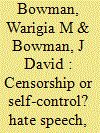|
|
|
Sort Order |
|
|
|
Items / Page
|
|
|
|
|
|
|
| Srl | Item |
| 1 |
ID:
147078


|
|
|
|
|
| Summary/Abstract |
In 2013, the Kenyan government adopted a hybrid censorship strategy that relied on regulation, the presence of a strong security state, and the willingness of Kenyans to self-censor. The goal of this censorship strategy was to ensure a peaceful election. This study examines two issues. First, it investigates steps taken by the Kenyan government to minimise hate speech. Second, it explores how efforts to minimise hate speech affected citizen communications over SMS during the 2013 election. An initial round of qualitative data was gathered (n = 101) through a structured exit interview administered election week. A statistically significant, representative sample of quantitative data was gathered by a reputable Kenyan polling firm (n ≥ 2000). Both sets of empirical data indicate that Kenyan citizens cooperated in large part with efforts to limit political speech. Yet speech was not always completely “peaceful’. Rather, voters used electronic media to insult, offend, and express contentious political views as well as express peace speech. This study argues that the empirical evidence suggests hate speech over text messages during the Kenyan election declined between 2008 and 2013.”
|
|
|
|
|
|
|
|
|
|
|
|
|
|
|
|
| 2 |
ID:
188089


|
|
|
|
|
| Summary/Abstract |
This study analyzes the effects of conspiracy beliefs on violent extremist intentions. More specifically, we investigate whether the relationship between conspiracy beliefs and violent extremism depends upon individual characteristics such as varying levels of self-efficacy, self-control, and law-relevant morality. Variable interactions examine where conspiracy beliefs exert strong effects on violent extremist intentions. The analysis is based on a German nationally representative survey (N = 1502). To our knowledge, it is the first and only nationally representative survey carried out in violent extremism research.
|
|
|
|
|
|
|
|
|
|
|
|
|
|
|
|
| 3 |
ID:
175748


|
|
|
|
|
| Summary/Abstract |
Correlations between terrorism and the religious commitments of terrorist organizations and actors have been the subject of extensive scholarly investigation. 1 Whilst the focus has often been on extreme Jihadist terrorism, other terrorist groups and individuals with religious commitments have been widely discussed such as Baruch Goldstein’s 1994 attack in Hebron, Christian Identity groups in the US, and Aum Shinrikyo in Japan. 2 A number of theories have been advanced to explain the relationships between religious commitment and terrorism. For example, Atran has argued that many terrorists are “devoted actors”, and that members of deeply conservative religions are typically devoted actors. 3 Whilst not denying that these factors may be important, this article draws attention to a further significant impact of religion on terrorism: the surprising connection between religion and self-control. 4 Drawing on the large empirical literature establishing a link between religion (in particular deeply conservative religions) and self-control, it is hypothesized that the religious practices of religiously-inspired terrorists enhances their self-control and thus raises their efficacy, operationalized as casualties per attack. This hypothesis will be referred to as TERS (Terrorist Efficacy, Religion and Self-control). TERS predicts that highly conservative religious terrorist groups such as Al Qaeda and ISIS will typically have higher levels of terrorist efficacy than non-religious or moderately religious groups, and the research of supports this hypothesis. 5 In addition, it is argued that TERS provides a crucial addition to Piazza’s emphasis on “universal/abstract” ideologies. 6 Piazza remarks that left-wing terrorist groups can have universal/abstract ideologies. Case studies of atheist left-wing terrorist groups—specifically the Red Army Faction and the Red Brigades—reveal that such groups satisfy Piazza’s characterization of universal/abstract groups but have casualty rates per attack very much lower than those of highly conservative religious groups such as Al Qaeda and its affiliates. It is argued that highly conservative religious convictions enhance the self-control of the latter groups, raising their efficacy relative to the former atheist groups.
|
|
|
|
|
|
|
|
|
|
|
|
|
|
|
|
|
|
|
|
|